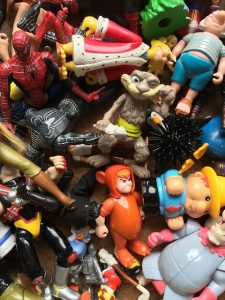 Staring at a lifetime of collectibles when it is time to downsize leads to all sorts of questions about what to do with them. Should they be given to children and grandchildren? And if so, will the recipients value the items as much as their original owners? If passing collectibles on to family members is not an option, there is always the possibility of donating the items or selling them outright.
Staring at a lifetime of collectibles when it is time to downsize leads to all sorts of questions about what to do with them. Should they be given to children and grandchildren? And if so, will the recipients value the items as much as their original owners? If passing collectibles on to family members is not an option, there is always the possibility of donating the items or selling them outright.
In this post, we will address the idea of selling collectibles. This choice is one we encounter quite frequently, and we try to give the best advice we can based on the knowledge we have.
To begin with, let us discuss what actually constitutes a collectible. A collectible is any item that belongs to a larger group of items commonly desired by collectors with similar interests. A good example would be marketing products bearing the Coca-Cola name and logo. There is an entire industry of Coca-Cola collectibles that makes some pieces extremely valuable. Collectibles can be anything from China dolls to movie posters to postage stamps and coins.
Things to Consider Before Selling
When a client decides selling collectibles is the best option, we may ask them to consider a few things first. These things are not meant to dissuade the client from making a decision to sell. Rather, we just want that decision to be an informed one. Here’s what needs to be considered:
1. Current Market Value
The current market value of any collectible is not determined by the owner’s emotional attachment to it. In other words, just because someone may believe a handmade doll is worth a certain amount of money does not make it so. Collectibles are very much driven by supply and demand. If other collectors are not interested in the items being sold, those items will not command a very high price.
2. Market Volatility
The collectibles market is a volatile one for a number of reasons. First and foremost, no standard pricing exists. Pricing is determined by supply and demand. Next, the collectibles market is not regulated. That means buyers and sellers are free to work out transactions between themselves without any interference. And third, the lack of pricing standards and regulation means it’s incredibly difficult to forecast what the market will be at any given time.
3. Authenticity and Provenance
There are two things collectibles need to command a high price even in a strong market: authenticity and provenance. We’ve been involved in more than one situation in which a client believes a collectible is genuine and authentic only to find out that it’s not. We hate to see people disappointed in this way because they not only fail to get the price they were asking but they also find out that something they’ve been holding onto for years is not what they thought it was.
A Financial and Emotional Decision
When you get right down to brass tacks, selling collectibles is both a financial and emotional decision. Furthermore, the two aspects are intertwined. Any decision to sell collectibles is likely to create an emotional reaction one way or the other among both owners and their family members. Therefore, selling is a decision that should be carefully considered.
We can help you deal with your collectibles if it’s time for you to downsize. Whether you donate them to charity, pass them on to family members or put them up for sale, we can help you make the process as easy as possible. My Divine Concierge specializes in senior concierge services – including downsizing and all that comes with it.
